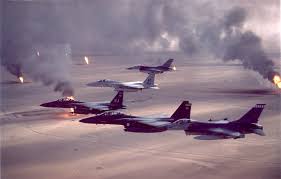Mideast & Persian Gulf
The Pentagon’s New Budget, New Strategy, and New War
Dislocating Alcyoneus: How to combat al-Qaeda and the new terrorism
The Coming Transformation of the Muslim World
Air Power Promises and Modernization Trends after Operation Desert Storm
by Alan Bloomgarden and Carl Conetta, Dec 1994.
➪ HTML
➪ PDF
This article first appeared in 1994 in a slightly edited form in Hawk Journal, the annual publication of the Royal Air Force Staff College.
The expectation of an airpower revolution began in earnest soon after victory in the first US-Iraq Gulf War, 1990-1991. Drawing extensively on official and outside expert assessment of airpower in “Operation Desert Storm,” this article critically reviews the evidence for an airpower revolution while summarizing a range of contemporary opinions on the issue.
Specifically, the article examines three claims advanced by airpower enthusiasts at the dawn of the post-Cold War period: that the Gulf War experience suggests greatly expanded options for limited-aims “raiding missions,” strategic bombing campaigns, and airpower dominance over the ground battle (using improved battlefield interdiction and close air support.)
Included are summaries of the extensive Gulf War Air Power Survey and other surveys of the war which provide an unsurpassed view of the war’s dynamics. It also examines the technologies, contemporary and in development, central to the putative airpower revolution.

Toward Defensive Restructuring in the Middle East
by Carl Conetta, Charles Knight, and Lutz Unterseher, PDA Research Monograph #1, February 1991.
➪ HTML ➪ PDF

Examines the character of force structure and military conflict in the Middle East and outlines a nonoffensive defense posture for nations in the region. It also draws the implications of such a posture for arms transfers and arms control policy. An appendix reviews the pertinent lessons of the 1990-91 Gulf War.
